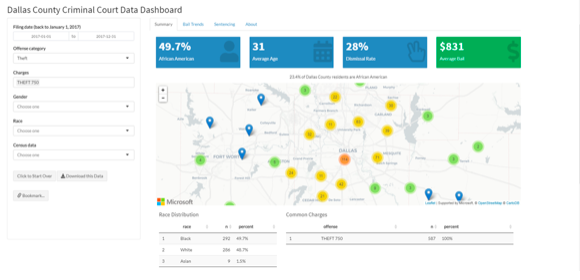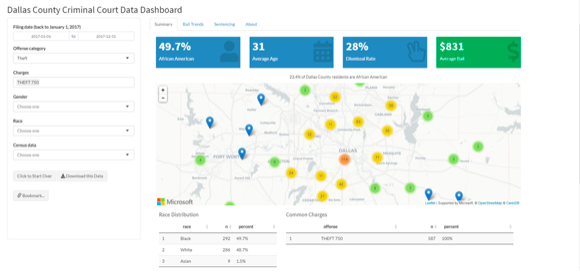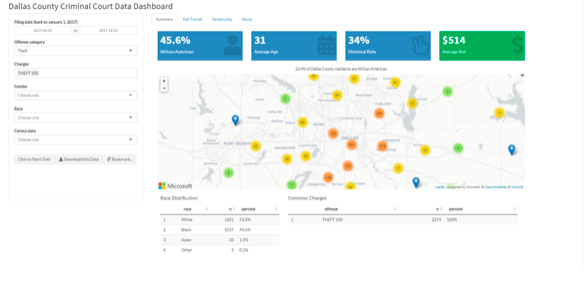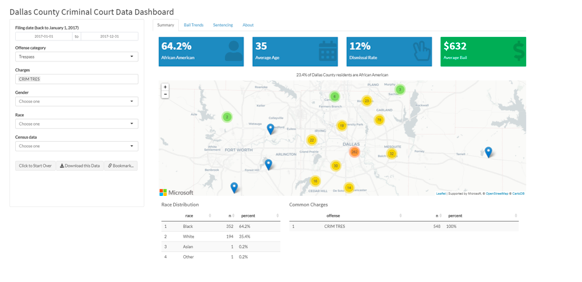
TCJC is excited to announce that our Dallas County Criminal Court Dashboard is now up and running at TCJCdashboard.org/dallas!
We’re giving you access to over 100,000 criminal court cases, right at your fingertips.
Acquiring the criminal court data for Dallas County was a much different process than obtaining the same data for our Harris County Dashboard. But through persistence and the ingenuity of our partners at January Advisors, we were able to obtain Dallas County case information dating back to January 1, 2017, and we are now able to visualize criminal court cases in Dallas County much in the same way that we have done for Harris County.
Why create dashboards?
While there continue to be many brilliant academics working with criminal justice data, we wanted to create a website that lets community members access the data in a way that’s understandable, and in a way that allows them to hold their elected officials accountable. For our Harris County Dashboard, we showed how the District Attorney’s marijuana diversion program was successful in reducing the number of marijuana charges filed, but unsuccessful in reducing the dramatic racial disparities in marijuana cases.
This is part of our broader ongoing effort, supported by the Microsoft Cities Team, to help communities make better use of criminal justice data by developing and sharing technical infrastructure and learnings from our data gathering and outreach efforts. We hope that increased transparency and accountability – as well as tools that facilitate better understanding of the stories and trends contained in this data – will empower communities, agencies, and policy-makers throughout the U.S. to engage in collaborative discussion and informed reform initiatives.
Why in Dallas and why now?
By building a Dallas County Dashboard, TCJC hopes to jumpstart the conversation about criminal justice data and create a tool for accountability for the Dallas County criminal legal system. And there are many opportunities to use the data to evaluate the progress of reforms.
Just last week, the newly elected Dallas County District Attorney, John Creuzot, announced a set of policies aimed at decarceration. The backlash from law enforcement was swift, and even the Governor weighed in! Critics charged that DA Creuzot’s new policies would weaken the rule of law and encourage illegal behavior. Conspicuously lacking from any of these critiques, however, was any mention of the relevant data. Responding to these critics, conservative reform advocate Doug Deason correctly highlighted that these reforms are modest and based on data. (Don’t forget to check out the excellent, data-driven work being done by Professor Pamela Metzger and her students at SMU’s Deason Criminal Justice Reform Center.)
Using TCJC’s Dallas County Dashboard, the public can now see the data and decide for themselves.
The most frequently criticized of DA Creuzot’s new reforms is his policy of not prosecuting individuals for the theft of property valued at less than $750, unless the evidence shows the theft “was for economic gain.” The impetus for this policy are cases like this one from December 2016, when a grandmother was charged and held on $150,000 bail for stealing $105 worth of school uniforms for her grandchildren. District Attorney Creuzot made clear that these policies would only apply to a limited number of theft cases, but the Dashboard can help us illuminate that discussion.
What does the data show?
Theft
Our Dallas County Dashboard allows the user to select individual charges (like theft) and see where defendants live (the Dashboard randomly and subtly alters the latitude and longitude of a defendant’s address so defendants cannot be identified); the Dashboard will also calculate the average bail amount for that charge, show dismissal rates, and much more!
We can use the Dashboard to see how the shoplifting cases that DA Creuzot is targeting – theft of property valued at $750 or less – looked in 2017:

In 2017, almost 50% of these 587 cases had an African-American defendant – more than double the proportion of African-American residents of Dallas County (23.4%). You can also see that the average bail for a defendant is $831, or $81 dollars more than the maximum amount of property that is alleged to be stolen – virtually ensuring that a defendant will remain incarcerated until the disposition of their case. This pretrial incarceration costs taxpayers far more than the property at issue without a clear public safety benefit. From this perspective, it’s hard to see how DA Creuzot’s limited exercise of compassionate discretion in these cases will do anything but benefit Dallas County residents.
A breakdown of theft cases from 2017 involving property valued at $100 or less shows a similar pattern, with a disproportionate number of African-American defendants and high bail amounts in relation to the value of the property at issue:

Criminal Trespass
A less buzzed about aspect of DA Creuzot’s plan relates to criminal trespass charges. He is instructing his intake prosecutors to “dismiss all misdemeanor criminal trespass cases that do not involve a residence or physical intrusion into property.” In a letter to his constituents, DA Creuzot cited the millions of dollars that Dallas County has spent criminalizing homelessness and mental illness. But there’s another aspect that goes unmentioned – the massive racial disparity in these cases:

Looking at the criminal trespass charges not involving a building or domicile, there were nearly as many criminal trespass charges filed in 2017 (548) as there were theft of $750 or less. The racial disparity in these cases is even more pronounced, with nearly 65% of these cases involving an African-American defendant.
Marijuana
DA Creuzot’s marijuana policy similarly takes aim at laws that appear to be disproportionately enforced against Dallas’ African-American residents. Nearly 55% of the over 6,000 cases filed in Dallas County in 2017 involved an African-American defendant:

When viewed in the context of the data, District Attorney Creuzot’s announced reforms are more modest than his critics would have you believe. Rather than an attempt to degrade the rule of law, these reforms are a critical first step at shrinking the size of Dallas County’s criminal legal system, as well as a step towards righting some of the historical wrongs associated with the racist history of Texas' criminal legal system.
What should come next for reform in Dallas County?
TCJC, January Advisors, and the Microsoft Cities Team built the Dallas County Dashboard so that everyone can dig into the Dallas County criminal justice data.
What other policies could DA Creuzot implement to further decarcerate Dallas County?
Please visit TCJCdashboard.org/dallas and let us know what else you find!
In the meantime, we’ll keep an eye on the progress of reforms under DA Creuzot and report back with our data findings. Stay tuned!
